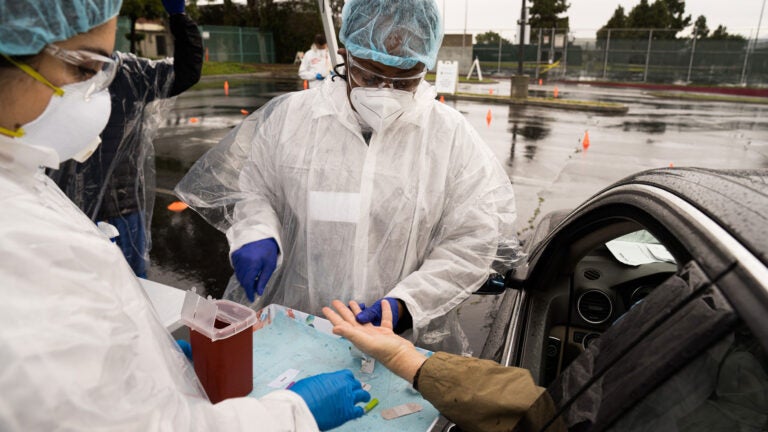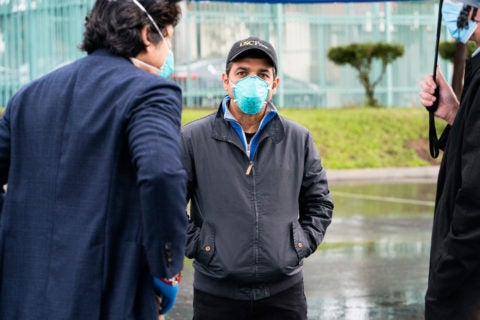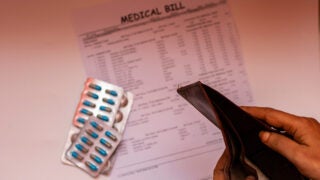
For the first round of COVID-19 antibody testing done on April 10 and 11, USC Price and the Los Angeles County Department of Public Health identified six sites for drive-thru testing. (Photo/Kit Karzen)
If you have questions about USC COVID-19 antibody testing in L.A. County, he has answers
Neeraj Sood of the USC Price School describes his partnership with the Los Angeles County Department of Public Health and explains what the tests can teach us about the novel coronavirus.
A USC researcher is leading a study with the Los Angeles County Department of Public Health that is testing thousands of Angelenos for antibodies to the virus that causes COVID-19 — a project that will provide a fuller picture of the pandemic and possible options to address the disease moving forward. A similar study in collaboration with Stanford University is being performed simultaneously in Santa Clara County.

Lead investigator Neeraj Sood, a professor of health policy and vice dean for research and faculty affairs at the USC Price School of Public Policy and senior fellow at the USC Leonard D. Schaeffer Center for Health Policy and Economics, answers questions about the research.
You’re going to be testing a randomly selected group of roughly 1,000 people every few weeks for several months. Why?
So far, all reports of confirmed cases have relied upon tests that detect active infection, which misses patients who were infected and recovered but not tested during their illness. In addition, to date most testing has focused on patients with severe COVID-19 symptoms. This “selection bias” doesn’t give us the complete picture.
We need to test a representative sample of the general population to understand basic facts about the disease: how widely the virus has spread, the mortality rate associated with infection and what potential immunity might be across a population.
Can you talk about how people were selected for this study?
Participants for the USC-L.A. County study were recruited by the market services firm LRW Group using a large proprietary database that ensures factors such as age, race and sex are part of the random selection. For the first testing that took place on April 10 and 11, USC and the L.A. County Department of Public Health identified six sites for drive-thru testing. Our plan moving forward is to test a different group of 1,000 randomly selected people every several weeks.
How reliable are the antibody tests?
Premier Biotech, the manufacturer of the test that USC and L.A. County are using, tested blood from COVID-19-positive patients with a 90 to 95% accuracy rate. The company also tested 371 COVID-19-negative patients, with only two false positives. We also validated these tests in a small sample at a lab at Stanford University. When we do our analysis, we will also adjust for false positives and false negatives.
How might the results be put into use immediately?
The results can be used to update estimates of the mortality of COVID-19, or the case fatality rate of the virus. The results can be used to update estimates of possible hospitalization or ICU rates of COVID-19 patients. All of these rates will be critical over the next few weeks to better predict COVID-19 death rates, how many more people might be hospitalized and how many ICU beds might be needed.
How does this study help us understand how deadly this disease is?
If you look at a mortality rate calculation, the numerator is the number of deaths and the denominator is the number of infections. It is the deaths per infection rate that interests us. The larger the denominator is, the lower the mortality rate. This rate matters because it informs us about the risk. It also can inform policymakers’ decisions on whether to keep stay-at-home orders and social distancing measures in place and for how long.
Who is funding and supporting this study?
Getting this study off the ground so quickly has been possible because of the support and funding of many. We are extremely grateful to President Carol L. Folt for the university’s support, to the Jedel Family Foundation, the USC Schwarzenegger Institute for State and Global Policy and their distinguished senior fellow L.A. Council member-elect Kevin de León, and the USC Lusk Center for Real Estate, along with many other individual donors who have gotten behind this important study.
Will the study help us understand which prevention measures are working or not working?
Our goal is to look at the association between people’s self-reported prevention measures and their risk of, or likelihood of, testing positive for COVID-19. This is where the repeated testing would help.
For example, if there is a cluster of ZIP codes where people say they are not doing social distancing and another cluster where people say they are doing strict social distancing, over time we would expect to see the epidemic curve flattening in ZIP codes where social distancing is practiced compared to the ZIP codes where it is not.
What are the limitations of this test?
The tests can be used for public health surveillance but it is unclear if they can be used to check for immunity. COVID-19 is a new disease, so we don’t know the extent to which tests identify neutralizing antibodies and the extent to which antibodies give immunity. Even if some immunity is conferred, we dont’t know how long this immunity lasts.
When will mass antibody testing be available?
We are working closely with City Council member-elect Kevin de León, who has been an early champion of this study, to make plans for introducing antibody testing for every Angeleno. He wants to make sure that testing is available to every health care worker, grocery worker and farm worker, as well as the millions of immigrants who are an integral part of our society.
What is herd immunity?
Mathematical models say that you get herd immunity when 60% of the population has antibodies, either through past infection or vaccination. Herd immunity means the epidemic will die down because not enough people without immunity are left in the population to keep spreading the disease to others.
But we don’t know for sure that COVID-19 antibodies give you immunity. And there may be people who aren’t susceptible to COVID-19 at all. For example, the number of infections in children have been fewer. Why is that the case?
Should employers also conduct antibody testing so they could certify or clear employees who can return to work?
I think it’s a complicated issue. With that approach, you create haves and have-nots. I’m not in favor of having these certificates and then using them as a precondition for entering the workforce. But I am in favor of everyone knowing whether or not they have the antibodies. People should be able to decide at some level how much risk they want to take.
Think about health care workers on the frontlines. Some might have antibodies, and if they know that they have those antibodies, they’ll feel less anxious. I’m all for testing health care workers if it can reduce their anxiety and the anxiety of their families.
If there is a shortage of personal protective equipment and there’s only one mask, who do you want to wear that mask? The person with antibodies or a person without antibodies? Ideally, you want everyone to wear a mask. But if there is a shortage, this also might help prioritize limited resources to certain individuals.



